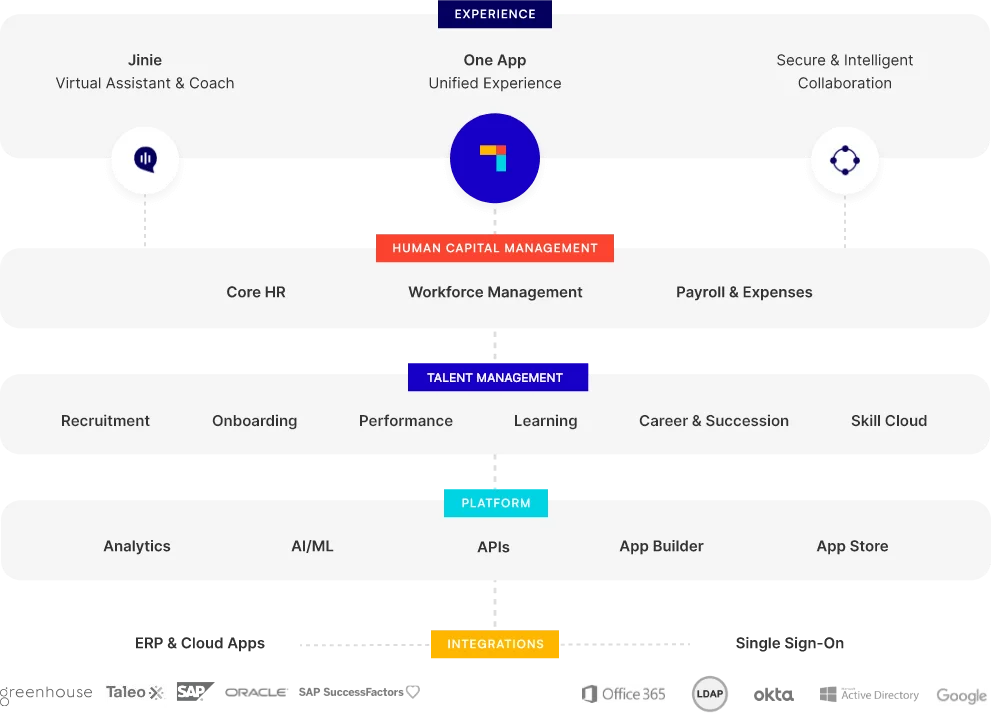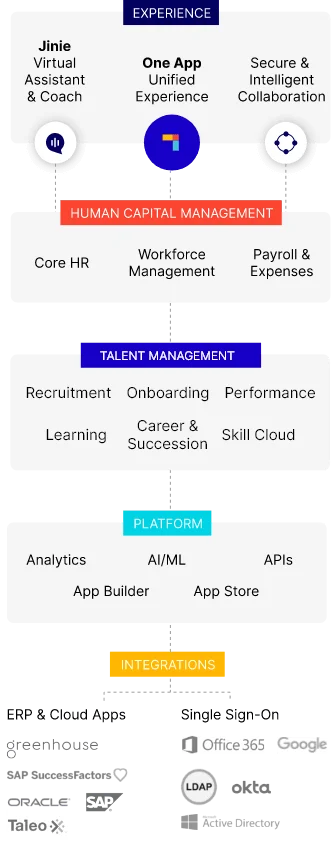Did you know that 70% of Middle Eastern workers are willing to resign from their posts due to a lack of flexibility? This concerning number shows how important workplace flexibility is in that region.
The Middle East’s economy is rapidly shifting, and HR practices are adapting to focus more on drawing in, retaining, and involving elite candidates in a field that is only becoming more competitive with time.
Two bold plans that are making companies reevaluate their recruiting practices are Saudi Arabia’s Vision 2030 and the United Arab Emirates Centennial Plan 2071.
HR practices have changed due to the growth of AI-based recruiting, hybrid workspaces, and employee wellness programs. Plus, tech-driven generations allow the younger to contribute a unique shift essential for firms to develop and evolve.
Then, what are the most important HR trends influencing 2025 in the Middle East?
Middle Eastern businesses are using innovative strategies, such as information-driven choices and personalized employee experiences, to create a workforce ready for the future.
This article will discuss the major HR changes that are taking place in the area and what businesses must do to remain relevant in this rapidly evolving market.
What Role Does HR Play in Businesses?
HR managers take care of their most important asset—employees. Being an effective HR manager involves more than just hiring and ensuring timely salaries. In today’s world, HR management focuses on creating an ideal working environment that keeps employees satisfied and supports their growth.
It ensures that the company operates efficiently and generates revenue to maintain its competitiveness, from recruiting the best talent to fostering a positive workplace culture. As work-life balance and employee well-being become increasingly important, HR is responsible for developing policies that benefit both the organization and its employees.
In a nutshell, a strong HR strategy guarantees that companies achieve major accomplishments in today’s ever-changing world.
Top 10 HR Trends in the Middle East 2025
By 2025, HR in the Middle East will experience a significant transformation. Companies are striving to develop innovative strategies and enhance their hiring practices. These strategies focus on hiring, managing, and retaining employees while adapting to government-led programs, workforce demands, and digitalization.
To cut the long story short, HR teams are working tirelessly to come up with innovative strategies to keep their businesses relevant in this increasingly competitive market.
Whether AI-driven recruitment strategies or employee well-being initiatives, here are the top 10 HR trends reshaping workplaces across the region.
1. AI-Driven Recruitment
The days of sorting through piles of resumes are long gone. Companies today are using AI-powered recruitment software and tools to speed up the recruitment process and stay relevant in the market.
With the help of such tools, HR managers can now automate screening, conduct online initial interviews, and predict the ideal candidate for the job. This helps them save time and reduces the age-old practice of hiring biases, increasing the quality of new hires.
According to a recent study, companies using AI in their recruitment drives increased the quality of new hires by 30%. AI-driven tools can scan through huge chunks of resumes in minutes, helping companies make informed decisions based on data, not gut feelings.
HR managers are also using chatbots and AI-driven assessments to improve candidate experience. Automated video interviews with the help of AI-based sentiment analysis help assess the interviewee’s communication skills, making the hiring process smoother.
2. Employee Mental Health and Well-being Take Center Stage
As technology continues to evolve rapidly, so does the work pressure to meet the demands. And for employees to function properly, prioritizing mental health has become a major priority for companies.
Mental health is no longer taboo; companies are investing heavily in employee well-being initiatives to ensure better productivity.
A McKinsey survey discovered that two-thirds of employees in the Gulf Cooperation Council (GCC) have been suffering from poor mental health. To provide support to their teams, companies are:
- Providing free therapy and counseling sessions
- Introducing Mental Health Days
- Help maintain work-life balance with flexible schedules
Employers encourage open mental health conversations by training managers to identify the early signs of stress and burnout. Most companies organize frequent mental wellness workshops and seminars and also build workplace meditation zones to help employees take a break from work and de-stress.
3. The Rise of Flexible Work Arrangements
Grinding from 9 to 5 in the office is gradually fading away. Nowadays, employees prefer flexibility, and companies are doing their best to meet their demands. Companies are developing hybrid work models where employees can split their time between working from home and in the office.
Organizations that offer remote or work-from-home options successfully retain their employees, boosting overall morale and drawing in highly qualified professionals.
Some companies in the Middle East are even introducing coworking space allowances for remote employees, to make sure that they can continue to work in a productive environment even when they are not at home. The Middle East co-working market space is predicted to reach USD 1053.1 million by 2023.
This HR trend is allowing Middle Eastern companies to adapt to the gig economy and sustain qualified individuals in an increasingly competitive digital world.
4. Upskilling and Reskilling Are a Must
AI and automation are revolutionizing industries, and to stay relevant and competitive in the market, workers must develop new skill sets.
Middle Eastern businesses are providing reskilling and upskilling initiatives to help workers stay competitive in the labor market. These initiatives assist employees by providing them with training in emerging technology, leadership, and digital skills. In turn, this increases their job market value.
Many businesses in the Middle East are collaborating with e-learning platforms like Coursera, Udemy, and LinkedIn Learning to provide employees with personalized career development programs. The learning experience is enhanced through gamified training and virtual reality simulations, making it more engaging and dynamic.
5. Diversity, Equity, and Inclusion (DEI) is a Priority
More and more companies across the Middle East are encouraging and implementing diverse recruitment, equitable pay, and inclusive workspaces. Saudi Arabia’s female workforce participation has reached 35.8% in 2024, surpassing the national targets.
Businesses are seeing the importance of diverse teams and how diversity increases productivity and enhances better financial performance. As a result, businesses are rolling out:
- Gender equality programs
- Unconscious bias training
- Inclusive workplace policies
With inclusive hiring, businesses are also providing opportunities to neurodiverse employees and people with disabilities. This is broadening the workplaces and encouraging talent from different backgrounds.
6. HR Goes Data-Driven
HR trends in the Middle East are bringing a holistic change to the global recruitment market. HR teams use data-driven analytics to monitor employment, turnover risks, and performance. Predictive analysis helps businesses identify problems at the preliminary stages and take the required measures before they escalate.
Businesses are using HR dashboards to keep a check on workplace trends and make practical decisions to enhance the work culture. HR trends in the Middle East are proving that data-backed decisions are improving the holistic overview of the future of workforce management.
A lot of businesses are relying on AI-driven sentiment analysis in employee surveys to judge workforce morale and take immediate action before disengagement leads to turnover.
7. Digital Transformation of HR
HR is undergoing a major tech makeover. Businesses are automating time-consuming operations like:
- Payroll processing
- Attendance monitoring
- Performance reviews
By the end of 2025, the majority of HR tasks will be automated, making room for HR teams to focus on major company goals like improving strategy and employee experience. HR trends in the Middle East are heading towards a place where technology-backed HR solutions will be the norm soon.
Companies in the Middle East are starting to implement blockchain for safe and fast payroll processing and AI chatbots for instant HR support. These implements are helping employees get instant answers to their queries and foster a healthy and cooperative work culture.
8. Adapting to New Labor Laws
Middle Eastern governments are revamping their labor laws to put them on the global map and meet international standards. HR teams have to always stay updated with the new trends and on top of these changes to ensure compliance.
Many new regulations are introduced in areas such as visa policies, employee rights, and workweek structures. This HR trend shows why businesses must be adaptable to changes to avoid legal issues.
9. Employee Experience Matters More Than Ever
Middle Eastern businesses are prioritizing making workplaces engaging and rewarding by improving:
- Onboarding experiences
- Career development programs
- Employee recognition initiatives
A happy and cooperative workforce ensures higher retention and productivity. HR trends show that employees who feel important and content are more likely to stay in the company and not swap jobs.
10. Remote Work Technologies are Taking Over
Especially after the pandemic, remote work is becoming the new normal. To keep up with this demand, businesses are investing in virtual collaboration tools like Microsoft Teams, Zoom, and Slack to keep employees connected and under supervision.
According to a survey, by the end of 2025, over 70% of Middle Eastern companies will have completely integrated remote work technologies, highlighting the importance of digital collaboration for success.
Are You Ready To Step in The New Era of HR?
HR in the Middle East is undergoing significant transformations in 2025. From AI-backed hiring to hybrid work models, companies are redefining how they attract, engage, and retain talent.
Employee well-being is a top priority, with an increased focus on mental health programs and flexible schedules. Upskilling and reskilling are essential to keep up with industry changes, while automation and data-driven decisions enhance HR processes.
Companies also embrace a holistic approach, recognizing that employees seek purpose, career growth, and supportive cultures. As DEI initiatives grow, HR professionals must adapt to these trends to stay competitive, ensuring businesses thrive in this evolving landscape.
PeopleStrong is trusted globally for its HR solutions and is shaping businesses to meet the rising demands of the market.
Schedule a demo today to equip your HR team to build a collaborative, adaptable, and forward-thinking workforce that fuels long-term success.
FAQs
What are the biggest HR trends shaping the Middle East in 2025?
The major HR trends revolve around AI-backed recruitment, hybrid work models, employee well-being practices, upskilling workshops, and DEI efforts. Some Middle Eastern companies are even using HR technology to automate processes and improve employee experiences.
Will automation and AI take over the role of human HR positions?
Although AI is significantly influencing HR procedures, human HR managers will always be in demand. On the other hand, by automating laborious processes like reviewing resumes and keeping track of employee information, AI assists HR professionals in making educated choices.
What industries in the Middle East are leading in HR innovation?
New HR trends including digital onboarding, statistical analysis, and flexible work practices are being used by a variety of industries, including IT, banking, and healthcare. Industries are successfully retaining staff while generating jobs by implementing these new HR practices.
What changes are we seeing in Middle Eastern employee well-being?
It has been accomplished in the Middle East to remove the stigma attached to mental health. Businesses in this region are creating wellness applications, hosting lectures on mental health, and providing flexible work schedules. One of the main HR trends that businesses are implementing as they recognize that contented workers generate more revenue is this all-encompassing strategy.
How will HR trends develop in the Middle East going forward?
HR trends have a bright future ahead of them, with a greater focus on advanced human resources analytics, skill-based hiring, and customized employee experiences. Businesses are going to be able to achieve success in this fiercely competitive market if they successfully adjust to these HR changes.













